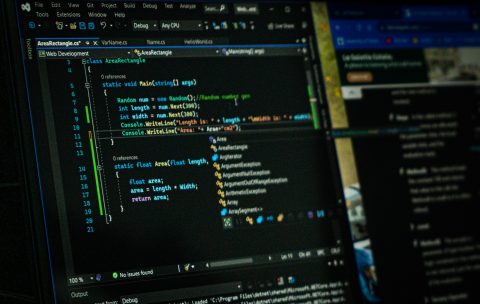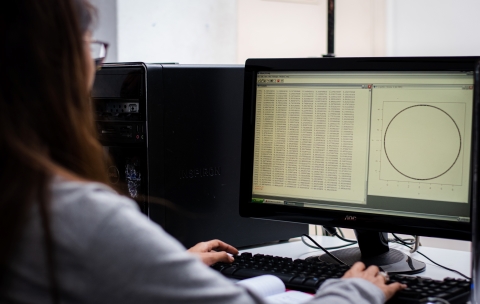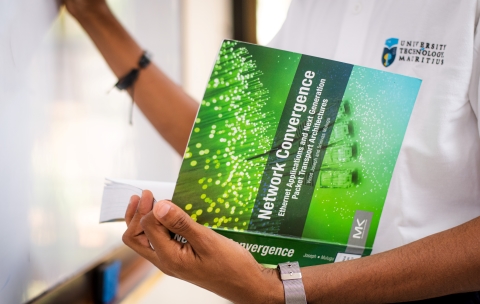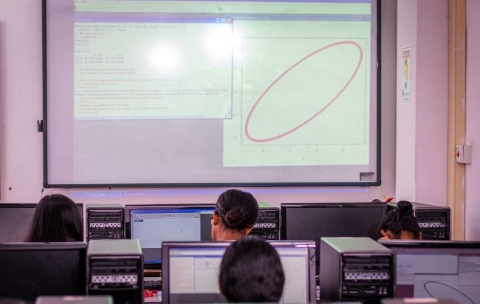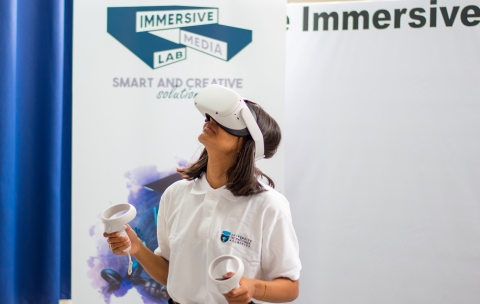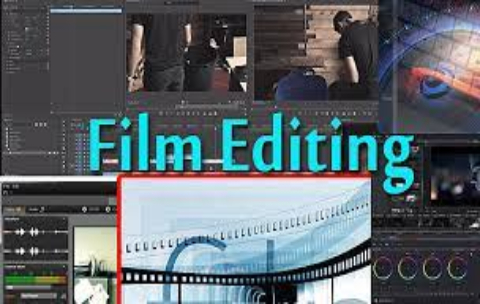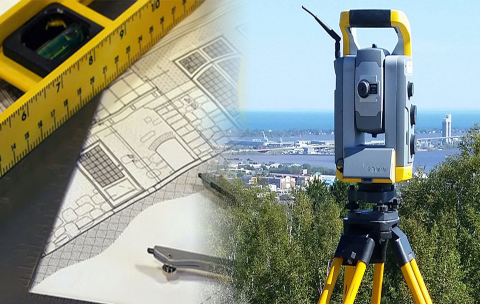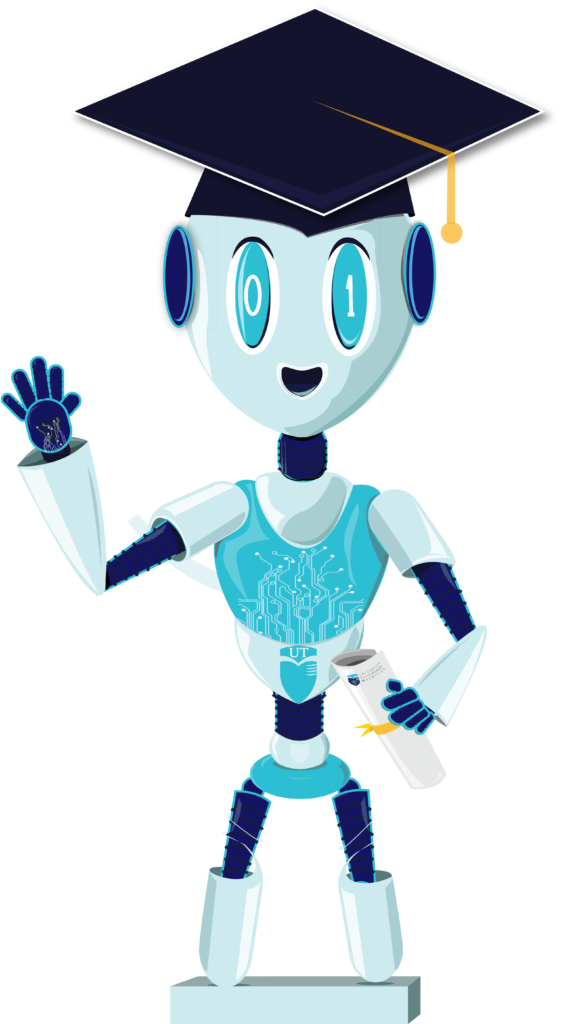Most popular
BSc (Hons) Software Engineering
29 Lessons
2 hours
All Levels
What you'll learn
Appreciate the functioning of a computer system and its operating systems
Understand the principles of data modelling
Solve problems through optimal modelling and implement solutions by developing applications
Design and develop network-based solutions
Communicate both orally and in writing using traditional and electronic media
Understand how a business is organised and relate to how ICT is ubiquitously applied across the different business functions
Identify and solve research problems in the software industry
Define, plan and monitor ICT projects in organisations
Design and develop interactive multimedia applications
Define and implement quality management systems in a software engineering environment
Develop web and mobile applications using a variety of technologies and architectures
Understand the concepts and applications of emerging technologies
BSc (Hons) Mathematics
29 Lessons
150 hours
All Levels
What you'll learn
A mastery of the principal skills required for work in mathematics.
Achieved a broad understanding and knowledge, and have an interest in and appreciation of mathematics.
Become conversant with information technology, communication and scientific presentation.
Acquire problem-solving attributes.
Skilled in the application of mathematics in a variety of fields, including science, engineering and business.
BSc (Hons) Computer Science with Network Security
29 Lessons
150 hours
All Levels
What you'll learn
Emphasizes the mathematical and theoretical foundations of computing such as programming, networks, database systems, cybersecurity, agile software design, mathematics, probability and statistics which cover the essential material required of all computer scientists, as well as a number of modules related to emerging technologies such as cloud computing, Internet of Things, Blockchain, Artificial Intelligence and Machine Learning.
Equips students with soft skill such as communication, collaboration and teamwork, time-management, self-discipline and leadership that are essential for readiness for a professional career as well as overall growth and development. These “softer” skills enable a graduate to adapt and succeed in the workplace.
Involves a substantial individual supervised capstone computer science project and work placement (internship) to allow students to put learning into practice and depict their potential. The curriculum provides a balanced and intellectually stimulating programme of theoretical and practical work.
MSc Computational Science and Engineering
13 Lessons
3 hours
All Levels
What you'll learn
Demonstrate a sound understanding of computational methods for solving scientific and engineering problems.
Be able to numerically simulate real world environments, and to understand the mathematics behind.
Possess problem solving techniques strongly transferable for immediate use within industry.
Be familiar with a variety of computerised and scientific tools for collecting and analysing data.
BSc (Hons) Financial Engineering
29 Lessons
3 hours
All Levels
What you'll learn
Ability to understand, the awareness of broader concepts of quantitative finance and computational finance.
Being able to efficiently apply computational techniques for solving various financial problems and create financial securities, amongst others.
MA Graphics Design
13 Lessons
3 hours
All Levels
What you'll learn
Understand, evaluate and apply/practice the processes involved in professional practice and academic research
Examine more thoroughly areas such as design history, theory, and criticism and to identify and anticipate research issues
Exhibit behaviours and attitudes of advanced study
Intellectual curiosity that extends beyond the teacher defined parameters of coursework
Evidence of self-motivated strategies for acquainting oneself with literature, cinema, photography, illustration, typography and critical discourse in the disciplines
Evidence of a process for considering researchable questions and addressing research issues
Ability to analyze and synthesize concepts and information from a variety of sources and to apply them in the exploration of visual communication problems
Creative insight and the ability to recognize and develop significant research opportunities
BSc (Hons) Emerging Technologies (Top-Up)
10 Lessons
1500 hours
All Levels
What you'll learn
Identify, formulate, and solve complex computing problems by applying their knowledge from the programme
Communicate effectively with a range of audiences and to function effectively on a team whose members together provide leadership, create a collaborative and inclusive environment, establish goals, plan tasks, and meet objectives
Develop and conduct appropriate applications to capture, store, analyze and interpret data, and draw conclusions in complex environments
Ability to develop innovative applications in the area of mobile computing, the Internet of Things, Cloud computing, and data management
Short programme in Film Editing
5 Lessons
1500 hours
What you'll learn
Understand the whole workflow of digital film production from pre to post production.
Understand and apply the principles for creative scriptwriting and storytelling.
Operate at post-production level for video editing, colour grading, application of Special Effects (sfx) and sound design.
Produce films, short videos and documentaries.
Handle and operate the camera properly.
BSc (Hons) Land Surveying (Top-Up)
9 Lessons
150 hours
All Levels
What you'll learn
Acquired adequate mathematical skills for spatial data analysis and interpretation.
Gained a broad insight in the legal framework for professional practice as surveyors.
Demonstrate an understanding of land surveying packages.
Showing an ability to examine land surveying.
Development of a sense of critical land surveying and land information reasoning.
Shown the necessary confidence in working independently and as a member of a team.
MSc Applied Statistics with Operational Research
12 Lessons
3 hours
All Levels
What you'll learn
Be able to manipulate, analyse and interpret real-world data.
Demonstrate a sound understanding on the advanced techniques employed to analyse complex organisational problems and help make better decisions.
Possess problem solving techniques strongly transferable for immediate use within industry.
Be able to deliver their competencies in the statistical models, relevant to the industry and hence become confident statistical analysts.
Be fluent with the main computational techniques used in applied statistics and operational research.
Trending
MSc Computational Science and Engineering
13 Lessons
3 hours
All Levels
What you'll learn
Demonstrate a sound understanding of computational methods for solving scientific and engineering problems.
Be able to numerically simulate real world environments, and to understand the mathematics behind.
Possess problem solving techniques strongly transferable for immediate use within industry.
Be familiar with a variety of computerised and scientific tools for collecting and analysing data.
BSc (Hons) Financial Engineering
29 Lessons
3 hours
All Levels
What you'll learn
Ability to understand, the awareness of broader concepts of quantitative finance and computational finance.
Being able to efficiently apply computational techniques for solving various financial problems and create financial securities, amongst others.
BSc (Hons) Software Engineering
29 Lessons
2 hours
All Levels
What you'll learn
Appreciate the functioning of a computer system and its operating systems
Understand the principles of data modelling
Solve problems through optimal modelling and implement solutions by developing applications
Design and develop network-based solutions
Communicate both orally and in writing using traditional and electronic media
Understand how a business is organised and relate to how ICT is ubiquitously applied across the different business functions
Identify and solve research problems in the software industry
Define, plan and monitor ICT projects in organisations
Design and develop interactive multimedia applications
Define and implement quality management systems in a software engineering environment
Develop web and mobile applications using a variety of technologies and architectures
Understand the concepts and applications of emerging technologies
MA Graphics Design
13 Lessons
3 hours
All Levels
What you'll learn
Understand, evaluate and apply/practice the processes involved in professional practice and academic research
Examine more thoroughly areas such as design history, theory, and criticism and to identify and anticipate research issues
Exhibit behaviours and attitudes of advanced study
Intellectual curiosity that extends beyond the teacher defined parameters of coursework
Evidence of self-motivated strategies for acquainting oneself with literature, cinema, photography, illustration, typography and critical discourse in the disciplines
Evidence of a process for considering researchable questions and addressing research issues
Ability to analyze and synthesize concepts and information from a variety of sources and to apply them in the exploration of visual communication problems
Creative insight and the ability to recognize and develop significant research opportunities
BSc (Hons) Mathematics
29 Lessons
150 hours
All Levels
What you'll learn
A mastery of the principal skills required for work in mathematics.
Achieved a broad understanding and knowledge, and have an interest in and appreciation of mathematics.
Become conversant with information technology, communication and scientific presentation.
Acquire problem-solving attributes.
Skilled in the application of mathematics in a variety of fields, including science, engineering and business.
BSc (Hons) Emerging Technologies (Top-Up)
10 Lessons
1500 hours
All Levels
What you'll learn
Identify, formulate, and solve complex computing problems by applying their knowledge from the programme
Communicate effectively with a range of audiences and to function effectively on a team whose members together provide leadership, create a collaborative and inclusive environment, establish goals, plan tasks, and meet objectives
Develop and conduct appropriate applications to capture, store, analyze and interpret data, and draw conclusions in complex environments
Ability to develop innovative applications in the area of mobile computing, the Internet of Things, Cloud computing, and data management
Short programme in Film Editing
5 Lessons
1500 hours
What you'll learn
Understand the whole workflow of digital film production from pre to post production.
Understand and apply the principles for creative scriptwriting and storytelling.
Operate at post-production level for video editing, colour grading, application of Special Effects (sfx) and sound design.
Produce films, short videos and documentaries.
Handle and operate the camera properly.
BSc (Hons) Land Surveying (Top-Up)
9 Lessons
150 hours
All Levels
What you'll learn
Acquired adequate mathematical skills for spatial data analysis and interpretation.
Gained a broad insight in the legal framework for professional practice as surveyors.
Demonstrate an understanding of land surveying packages.
Showing an ability to examine land surveying.
Development of a sense of critical land surveying and land information reasoning.
Shown the necessary confidence in working independently and as a member of a team.
MSc Applied Statistics with Operational Research
12 Lessons
3 hours
All Levels
What you'll learn
Be able to manipulate, analyse and interpret real-world data.
Demonstrate a sound understanding on the advanced techniques employed to analyse complex organisational problems and help make better decisions.
Possess problem solving techniques strongly transferable for immediate use within industry.
Be able to deliver their competencies in the statistical models, relevant to the industry and hence become confident statistical analysts.
Be fluent with the main computational techniques used in applied statistics and operational research.
BSc (Hons) Network and Telecommunication Technologies
8 Lessons
1500 hours
All Levels
What you'll learn
Knowledge of the physical and logical principles that determine how data networks and various telecommunications systems work
Ability to integrate multiple technologies in addressing organizational solutions
Demonstrate an understanding of industry-standard best practices in working with telecommunications technologies
Technical skill to design and install to meet a specification and manage a networked system
Display an appreciation of network-based application development
Select and configure appropriate hardware and software to implement a networked system design
Identify and solve problems in the operation of networked systems
Capacity to pursue an independent investigation using learning resources and practical evaluation
Demonstrate critical thinking and communication skills required in a technical environment
Communicate effectively verbally and in writing
Finally, demonstrate sufficient background knowledge to serve as a foundation for continued studies
We found 1 course available for you
Filter by Level
Filter by School
Filter by Department
- Accounting, Finance and Economics, Department of
- Applied Mathematical Sciences
- Business Informatics and Software Engineering
- Business Management and Law, Department of
- Creative Arts, Film and Media Technologies
- Environment Science and Social Sustainability, Department of
- Industrial Systems Engineering
- Logistics and Transport Management
- Tourism Leisure and Services, Department of
Search
Beginner
BA(Hons) Art and Design (Top Up) Collaborative Programme with FDI
Programme Information Art and Design is a multi-disciplinary field focusing …
Free

